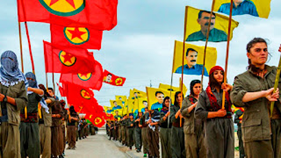
After 25 years in prison, PKK leader Abdullah Ocalan decides to bring down the curtain and dissolve his party. The party was founded in 1984 on the basis of Marxist-Leninist doctrine, but after its leader read Murray Bookchin in prison, it declared itself a “democratic confederalist” party, offering a very peculiar reinterpretation of Bookchin’s ideas as a mixture of Leninism and social democracy with feminist and ecological discourse, all against the backdrop of the cult of personality of the leader.
The PKK actually ran in Turkey’s parliamentary elections a few years ago and won several seats, but because it did not lay down its arms, Erdogan’s government classified it as a “terrorist organization” and it became illegal again.
At the same time, several political shifts have emerged in recent years that could affect the legal status of Ocalan (sentenced to life imprisonment). In October 2024, Devlet Bahçeli, leader of the Nationalist Movement Party and a key ally of President Erdoğan, suggested that Öcalan’s sentence could be reviewed if the PKK laid down its arms. Later in February 2025, Ocalan called on the PKK to dissolve itself and give up the armed struggle, prompting the group to declare a ceasefire and announce its future dissolution, which finally happened a few days ago.
According to its recent 12th Congress, the PKK has “destroyed the policy of denial and destruction imposed” on Turkey’s Kurdish population and “brought the Kurdish question to a point where it can be resolved through democratic politics, thus fulfilling its historical mission.” Without a doubt, the only thing that can resolve this is for the former PKK leaders to enter the Turkish parliament, as they have always planned, as part of new political parties free from the historical burden of the PKK. Despite his more or less straightforward statements, Ocalan eventually conceded defeat and is positioning himself as a future social democratic leader after his apparently negotiated release. We will soon see him at the head of a new party. Who knows whether he will again stick to his particular interpretation of Bookchin’s ideas, hoping they will bear fruit, or perhaps take a more traditional position, this time closer to European social democracy.
Despite the disastrous and bitter historical experience of anarchism mixing with movements, trade unions and political parties that put “national liberation” above social revolution, today, in the twenty-first century, many anarchists join such movements, which inevitably end up betrayed in some parliament, begging for a place in power. A position, this time closer to European social democracy.
Let’s not let ourselves be distracted any further. A true anarchist movement is one that openly advocates social revolution above all else, including the “liberation” of any “people” or “nation,” simply because any “national liberation” (even if cloaked in feminist or environmentalist garb) is nothing more than a deception whose goal is to replace one government with another, one oppressor and exploiter with another, deceiving us with promises of “becoming one of us.” Only a social revolution that destroys the government and establishes anarchist communism from the bottom up, organized in free communes, can achieve the liberation of the peoples. And no political party will ever achieve that, even if it calls itself “democratic confederalist.”
Full KPAC/Cras article – https://aitrus.info/node/6310
Original Spanish article – https://bibliotecadigitalbdela.blogspot.com/2025/05/se-cae-la-farsa-del-confederalismo.html